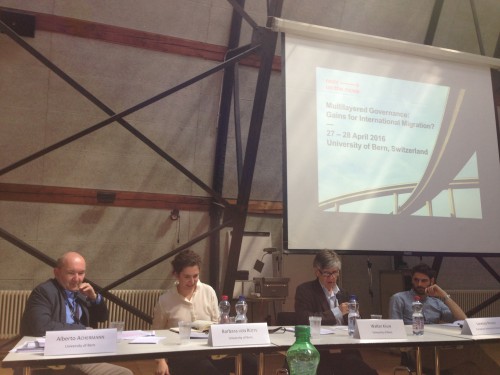Multilayered Governance: Gains for International Migration? An Epilog.
The nccr – on the move and the Institute of Public Law of the University of Bern convened a two-day conference, which took place from 27–28 April 2016 at the University of Bern, Switzerland. The aim was to bring together academics and policy-makers from a wide range of disciplines to evaluate the efficiency gains and legitimacy risks associated with the concept of multi-layered governance in particular when framing migration law & policy-making.
The conference asked under what conditions “layering” is desirable how it could be designed to minimize the risk of particularization and escapism and prevent governance gaps within nested structures. The research question, investigated by all contributors, was whether fragmentation is necessarily negative – or how governance, particularly if multi-layered – could lead to positive outcomes increasing regime competition, policy diffusion and compliance and so enhance access, development and rights protection in migration. Key interrogations were the role of different institutions (UN, regional, multilateral etc.) in migration governance, the optimal layer for regulating particular aspects of migration policy (visa, border control, labor standards) or the manner in which the dialogue between the different layers should be organized.

Alberto Achermann, Barbara von Rütte, Walter Kälin, and Lorenzo Piccoli (from left to right)
Talking across disciplines’ were legal, sociology, anthropology, economic, international relations scholars working on migration and governance from Asia, Africa, the US, Europe, notably Alex Betts, Oxford University, Andrew Geddes, Sheffield University, Tiziana Caponio, Turin University, Sandra Lavenex, University of Geneva, and representatives from think tanks, such as Sergio Carrera from CEPS (Brussels), public officials from immigration and foreign affairs offices most notably Eduard Gnesa (Switzerland), and international organizations – UN (Colleen Thouez), ICMPD (Martin Hofman), ILO (Marie-José Tayah).
Conference highlights
In his keynote speech on Wednesday morning, Alex Betts (Oxford University), framed governance in regime theory and challenged the intrinsic value of governance – is it a self-fulfilling instrument or one shaped by power and interests? On the basis of the EU-Turkey deal, he further advanced a centric type of governance for migration, in view to de-fragment the “piecemeal” approach to international legal and policy regime for migration, which accounts to governance gaps, increased vulnerability and migrant discrimination.
In the public lecture of the nccr – on the move, which took place on Thursday evening, Andrew Geddes (Sheffield University), most notably shifted the discussion away from the neo-functionalist frame to a behavioral approach. Drawing on extensive fieldwork in the scope of the MIGPROSP project with immigration ministries across four regions (N-America, S-America, Asia, Europe) he asked how the behavior, bias, beliefs of bureaucrats, elites and other epistemic communities about migration risks and uncertainty shape knowledge and data, but also migration law and policy and thus, migration governance.
With fifty participants, and more for the public lecture, including attendants from the Swiss Agency for Development, Foreign Affairs, but also locals from the neighborhood, students and researchers from several Swiss universities, including from nccr –on the move and NCCR-Trade, the conference provided an excellent forum for exchange on governance and migration and hopes to add to the theory of governance and practice of migration law-making.
Marion Panizzon, Senior Research Fellow, nccr – on the move, Institute of Public Law, University of Bern.
More information, such as the detailed program and abstracts can be found here.

